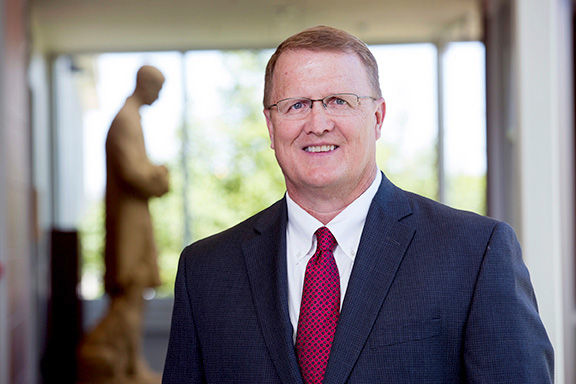A reflection of Patrick Halbur’s experience as an interim dean

Courtesy of Christopher Gannon
Dr. Pat Halbur, professor and chair of veterinary diagnostic and production animal medicine, has been named interim dean of Iowa State Universityís College of Veterinary Medicine. (Christopher Gannon/Iowa State University)
February 17, 2018
How did Patrick Halbur end up as interim dean of the Iowa State College of Veterinary Medicine? Well, the story is: “the provost just called me up and asked.”
Halbur, who holds degrees in veterinary pathology from Iowa State, is no stranger to holding administrative positions.
“I have a lot of experience working my way up through levels of faculty,” Halbur said. “My guess is that the provost looked at that and thought I could hold it together.”
After receiving his first degree from Iowa State, a doctorate of veterinary medicine, Halbur was a private veterinary practitioner in Williamsburg, Iowa.
His wife, Therese Halbur, decided to take a job in Ames as a pediatrician, so he “somewhat reluctantly” sold out of his private practice and came back to graduate school in Ames, where he received his masters and doctorate, both in veterinary pathology.
“I am best known in Ames as the spouse of Dr. Halbur. It’s true,” Halbur joked.
Dave Gieseke, communications manager of the College of Vet Med, was also present during the conversation.
“It is true! She was my kids’ pediatrician,” Gieseke said, backing up Halbur.
Halbur has four children of his own — a high school student, a dentist in Cedar Falls, Iowa, a student at the University of Southern California and a student finishing a Ph.D. at the University of Wisconsin.
Halbur speaks passionately about the College of Vet Med. His words show a pride and allegiance to the college.
“We serve the most progressive livestock and poultry producers in the world. That keeps us on the cutting edge of research,” Halbur said. “And if we are producing vets to serve in those positions, we have to be on the cutting edge for teaching.”
The college implemented a $1.25 million budget cut during Halbur’s first month on the job. He believes they did it in a way that had very little, if any, effect on the students.
Halbur shared the first question the college asks before doing something administratively is: “How will this affect the students?”
“Because the most important thing we do here is educate future veterinarians,” Halbur said.
Since stepping in as interim dean, Halbur has also been a part of three “rigorous” accreditation processes. One from the American Veterinary Medical Association (AVMA), one in regards to the diagnostic lab and one in regards to the college’s hospital.
The college was successful in accreditation of its diagnostic lab and hospital, and will find out it’s results from AVMA very soon.
The college has been working to educate the public and the legislature on the need for a new diagnostic lab.
“We have the largest, and I’m quite sure the most progressive, veterinary diagnostic lab in the nation,” Halbur said. “But it’s in a 42-year-old facility.”
Halbur said the college has been working extensively over the last couple of months to make sure legislators understand the college’s needs, and he is hopeful the college will be successful in getting some money to start the project.
The new diagnostic lab will cost $124 million.
On the topic of issues within the college, Halbur noted mental health and wellness and student loan debt as two significant ones.
Halbur said the college brings in wellness speakers on a regular basis and is working closely with the senior vice president for the student affairs office to bring wellness and mental health counseling services on site at the college.
“It’s difficult for our students to get over to main campus [for counseling services] during regular hours, and they deal with some issues that undergraduate students don’t,” Halbur said. “For me, it’s a very high priority to address wellness and mental health of our students.”
Halbur said student debt is another issue and a challenge nationally for the veterinary profession.
Iowa State’s veterinary medicine program is number 26 out of 30 vet schools in the nation for highest resident cost of education, so 25 of the other vet schools have higher costs.
“I think we have a quality product at a fair price,” Halbur said. “But I still think it costs enough to go here and the debt is high enough that there’s a substantial number of students who would like to become veterinarians, but they’re choosing other careers because of the debt.”
Halbur was announced as the third and final candidate for the permanent dean position in February.
The Vet Med dean search is ongoing, the college announced it will continue looking for new dean after holding open forums for the three candidates. The college doesn’t feel like it has found the right person yet.















